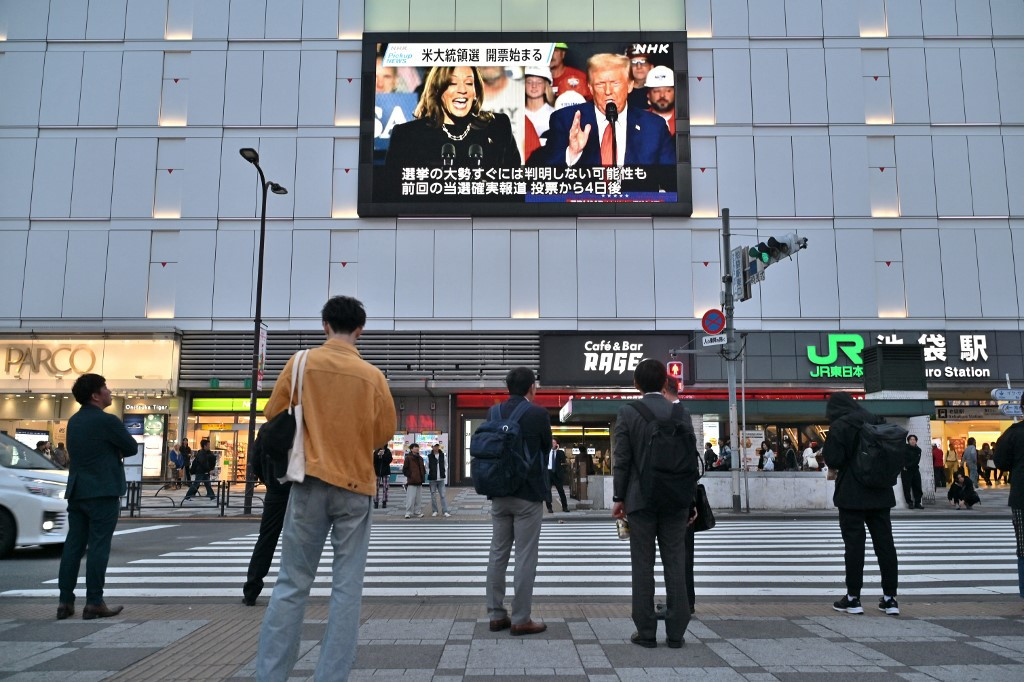Popular Reads
Top Results
Can't find what you're looking for?
View all search resultsPopular Reads
Top Results
Can't find what you're looking for?
View all search resultsTrump victory to reverberate through global economy
Fed will have to keep rates high, hitting emerging markets
Change text size
Gift Premium Articles
to Anyone
D
onald Trump's victory in the race to become the next US president will, if confirmed, have economic consequences for the rest of the world that are likely to be deep and quite immediate.
As congratulations poured in from world leaders, Trump claimed on Wednesday he had been given a "powerful mandate" to rule.
If he enacts just a fraction of his pledges - from higher trade tariffs to deregulation, more oil drilling and more demands on America's NATO partners - the strain on government finances, inflation, economic growth and interest rates will be felt in every corner of the world.
Trump's Republican Party also secured the Senate and was making gains in the House of Representatives, potentially making it easier for the president to legislate his proposals and push through key appointments.
"Trump's fiscal pledges are seriously troublesome – for the US economy and for global financial markets – as they promise to vastly expand an already excessive deficit at the same time as he threatens to undermine key institutions," Erik Nielsen, UniCredit's Group Chief Economics Advisor, said.
"One must conclude that Trump poses a serious – and so far vastly under-appreciated - threat to the US Treasury market and thereby to global financial stability," Nielsen said.
Import duties, including a 10 percent universal tariff on imports from all foreign countries and a 60 percent tariff on imports from China, are a key plank of Trump's policies and likely to have the biggest global impact.
Tariffs inhibit global trade, lower growth for exporters, and weigh on public finances for all parties involved. They are likely to raise inflation in the United States, forcing the US Federal Reserve to act with tighter monetary policy.
The International Monetary Fund has already characterized global growth as weak, with most nations producing "feeble" expansion. A further hit to global trade is likely to present a downside risk to its 3.2 percent GDP growth projection for next year.
Firms mostly pass import costs onto the customer, so tariffs are likely to be inflationary for US buyers, forcing the Fed to keep interest rates high for longer or to even reverse course and hike borrowing costs once again.
This will be even more likely if Trump keeps his spending and tax pledges, which could increase the US debt by $7.75 trillion through 2035, according to the non-partisan Committee for a Responsible Federal Budget.
"Higher inflation would weigh on domestic demand, especially as it would call for a restrictive monetary policy response, with a negative impact on growth," Anis Bensaidani at BNP Paribas said.
CHINA, MEXICO IN CROSSHAIRS
For emerging markets relying on dollar funding, such a policy mix will make borrowing more expensive, dealing a double blow on top of the lost exports.
The same forces that could push up US inflation could weigh on prices elsewhere, especially if Trump slaps oversized duties on China as he has promised.
As the world's largest exporter, China is desperate to resurrect growth, so it may seek new markets for goods squeezed out of the US and dump products elsewhere, especially Europe.
Central banks are likely to react quickly as business sentiment, especially for trade-reliant open economies, will deteriorate quickly.
"Even before a fall in the surveys, the ECB could be tempted to accelerate its rate cuts to a 2 percent neutral rate and, once the US tariff policies become clearer, it would be reasonable to cut rates to below neutral," JP Morgan's Greg Fuzesi said.
Governments are also likely to retaliate against any US import duty, inhibiting trade further and cutting deeper into global growth.
High Fed rates and lower borrowing costs elsewhere would also boost the dollar - as evidenced by the 1.5 percent drop in the value of the euro and the yen overnight - dealing even more pain to emerging markets since over 60 percent of international debt is denominated in dollars.
Mexico could be the hardest hit given Trump's rhetoric on closing the border, which comes against an already deteriorating domestic outlook.
"Mexico is most at risk," TSLombard's Jon Harrison said as the Mexican peso fell 3 percent against the dollar.
Mexico is especially vulnerable because trade tensions and threats of deportations could exacerbate domestic problems like cartel activity and the government's failure to curb violence, Harrison added.
Among potential winners, Brazil might enjoy greater trade with China given that Beijing replaced all its US soybean imports with Brazilian ones when trade tensions flared during Trump's first presidency.
But Europe could also suffer the added blow of increased defense costs if Trump reduces support for NATO.
The continent has relied on a US military presence since the end of World War Two and with no end in sight to Russia's war in Ukraine, Europe will be forced to fill any gap left by a US retreat.
But government debt in Europe is already close to 90 percent of GDP, so finances are stretched and governments will struggle to stimulate an economy suffering from trade barriers while funding military spending at the same time.
Trump's deregulation efforts are likely to play out over a longer period but internationally-agreed proposals aimed at making banks more resilient, commonly known as Basel III, could be a first casualty.
The new rules are set to apply from Jan. 1 and policymakers are already debating whether they should go ahead even if the US pulls out.











